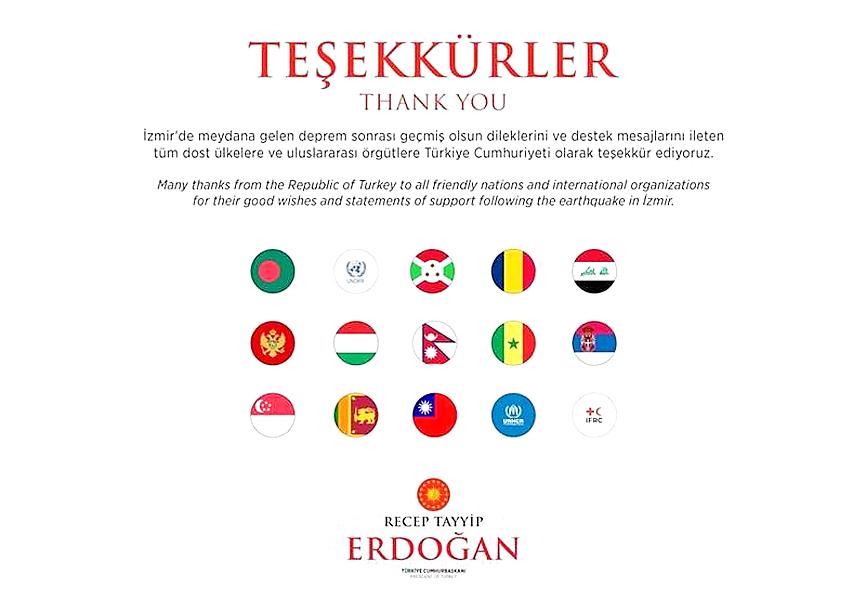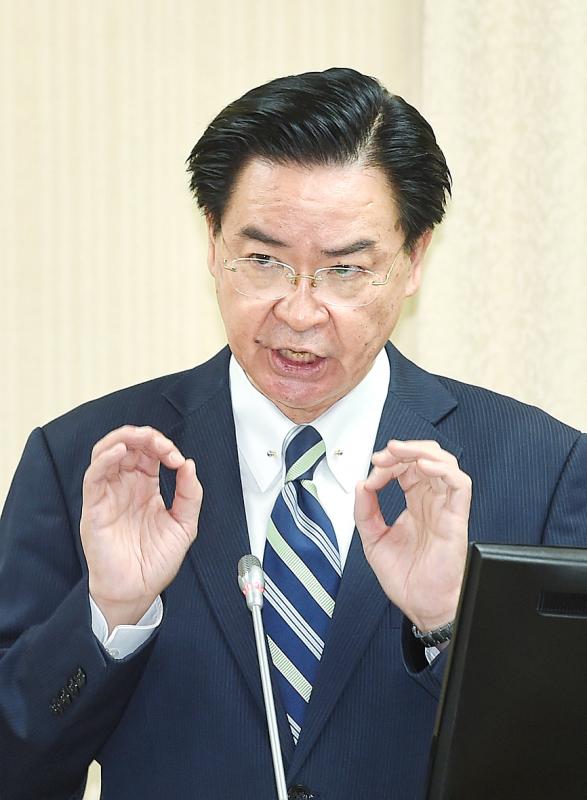A decision by Turkish President Recep Tayyip Erdogan to remove the Republic of China (ROC) flag from a thank-you tweet to countries that offered support in the wake of Friday’s massive earthquake was due to pressure from China, which was regrettable, top officials said yesterday.
While Erdogan did not name the countries and organizations that reached out to Turkey after the magnitude 7 quake on Saturday, he posted pictures of their flags, but the tweet was later taken down and replaced with a new one that did not include the ROC flag.
Turkey maintains diplomatic ties with China.

Photo: Screen grab from Twitter
“According to information obtained by our representative office in Turkey, it was due to China’s meddling and pressure,” Minister of Foreign Affairs Joseph Wu (吳釗燮) told reporters in front of the Legislative Yuan in Taipei attending a legislative hearing.
He said Taiwan, as a nation that upholds human rights, would continue to provide humanitarian assistance to other countries that need help, such as the Philippines and Vietnam after recent devastating typhoons.
“We condemn China’s regrettable intervention and repression on a matter of humanitarian assistance that has no political implications,” Wu said.

Photo: Fang Pin-chao, Taipei Times
Premier Su Tseng-chang (蘇貞昌) said the issue showed that the Chinese government was “narrow-minded,” as it was normal for a country to express appreciation to others that offer support in times of crisis.
“What China did was try to restrict Taiwan’s international space,” Su said on the sidelines of a ceremony to commend government agencies providing open data.
In the face of such repression, Taiwanese should realize that Taiwan can only hold its place in the international community by standing on its own feet, he said.
The overall death toll from Friday’s quake reached 87 yesterday, after search-and-rescue teams found more bodies amid toppled buildings in Izmir, Turkey’s third-largest city.
Close to 1,000 people were injured, mostly in Turkey, by the quake, which was centered in the Aegean Sea northeast of the Greek island of Samos.
The tremors were felt across western Turkey, as well as in the Greek capital, Athens. Hundreds of aftershocks have followed.
In other developments, the Ministry of National Defense said that Chinese People’s Liberation Army (PLA) aircraft yesterday entered Taiwan’s southwest air defense identification zone on eight separate occasions, the 32nd day such incursions have occurred since the middle of September.
The Chinese aircraft involved were one Y-8 marine patrol plane, one Y-8 tactical reconnaissance aircraft, two Su-30 jets, two J-16 fighters and two J-10 jets, the defense ministry said.
The air force scrambled planes to monitor the Chinese aircraft, issuing radio warnings and mobilizing air defense assets before the Chinese planes left the air defense identification zone, it said.
It was the ninth consecutive day of incursions and the 32nd day on which such incursions have taken place since Sept. 16, a day before the defense ministry began regularly publishing details of Chinese military movements on its Web site.

SECURITY: As China is ‘reshaping’ Hong Kong’s population, Taiwan must raise the eligibility threshold for applications from Hong Kongers, Chiu Chui-cheng said When Hong Kong and Macau citizens apply for residency in Taiwan, it would be under a new category that includes a “national security observation period,” Mainland Affairs Council (MAC) Minister Chiu Chui-cheng (邱垂正) said yesterday. President William Lai (賴清德) on March 13 announced 17 strategies to counter China’s aggression toward Taiwan, including incorporating national security considerations into the review process for residency applications from Hong Kong and Macau citizens. The situation in Hong Kong is constantly changing, Chiu said to media yesterday on the sidelines of the Taipei Technology Run hosted by the Taipei Neihu Technology Park Development Association. With

CARROT AND STICK: While unrelenting in its military threats, China attracted nearly 40,000 Taiwanese to over 400 business events last year Nearly 40,000 Taiwanese last year joined industry events in China, such as conferences and trade fairs, supported by the Chinese government, a study showed yesterday, as Beijing ramps up a charm offensive toward Taipei alongside military pressure. China has long taken a carrot-and-stick approach to Taiwan, threatening it with the prospect of military action while reaching out to those it believes are amenable to Beijing’s point of view. Taiwanese security officials are wary of what they see as Beijing’s influence campaigns to sway public opinion after Taipei and Beijing gradually resumed travel links halted by the COVID-19 pandemic, but the scale of

A US Marine Corps regiment equipped with Naval Strike Missiles (NSM) is set to participate in the upcoming Balikatan 25 exercise in the Luzon Strait, marking the system’s first-ever deployment in the Philippines. US and Philippine officials have separately confirmed that the Navy Marine Expeditionary Ship Interdiction System (NMESIS) — the mobile launch platform for the Naval Strike Missile — would take part in the joint exercise. The missiles are being deployed to “a strategic first island chain chokepoint” in the waters between Taiwan proper and the Philippines, US-based Naval News reported. “The Luzon Strait and Bashi Channel represent a critical access

Pope Francis is be laid to rest on Saturday after lying in state for three days in St Peter’s Basilica, where the faithful are expected to flock to pay their respects to history’s first Latin American pontiff. The cardinals met yesterday in the Vatican’s synod hall to chart the next steps before a conclave begins to choose Francis’ successor, as condolences poured in from around the world. According to current norms, the conclave must begin between May 5 and 10. The cardinals set the funeral for Saturday at 10am in St Peter’s Square, to be celebrated by the dean of the College